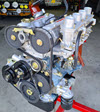| Author |
Message |
Spacer101
Samba Member
Joined: June 24, 2023
Posts: 31
Location: DC area

|
 Posted: Tue Jun 24, 2025 8:54 am Post subject: Do I need to change timing in T2 with FI for altitude? Posted: Tue Jun 24, 2025 8:54 am Post subject: Do I need to change timing in T2 with FI for altitude? |
 |
|
Hi,
Going from LA to Colorado to ~9000ft. Do I need to adjust the timing when going higher ?
1975 T2 with 1979 fuel injected engine.
Thanks!!! |
|
| Back to top |
|
 |
airschooled
Air-Schooled

Joined: April 04, 2012
Posts: 13481
Location: West Coast, USA

|
 Posted: Tue Jun 24, 2025 9:32 am Post subject: Re: Do I need to change timing in T2 with FI for altitude? Posted: Tue Jun 24, 2025 9:32 am Post subject: Re: Do I need to change timing in T2 with FI for altitude? |
 |
|
I only do it when I’m staying a while. And I’m fast at that kinda stuff, so like, two days is “a while” for me. I don’t mess if I’m just passing through to Kansas.
You can grande your engine when you go back down if you forget. If you have the 75 or 79 DVDA, pulling the retard hose off the distributor and letting it leak is an easier way to recover your idle quality and throttle response. If you want power back on the high end, reset the timing.
Last time I took seven adults in a 2L type 4 over the Rockies I set 36* max mechanical advance and used premium fuel for the first time. L-Jet does much better at elevation than my single carburetor Type 1…
Robbie
_________________
One-on-one tech help for your vintage Volkswagen:
www.airschooled.com
https://www.patreon.com/airschooled |
|
| Back to top |
|
 |
Wildthings
Samba Member

Joined: March 13, 2005
Posts: 52334

|
 Posted: Tue Jun 24, 2025 10:11 am Post subject: Re: Do I need to change timing in T2 with FI for altitude? Posted: Tue Jun 24, 2025 10:11 am Post subject: Re: Do I need to change timing in T2 with FI for altitude? |
 |
|
| Spacer101 wrote: |
Hi,
Going from LA to Colorado to ~9000ft. Do I need to adjust the timing when going higher ?
1975 T2 with 1979 fuel injected engine.
Thanks!!! |
The general rule is one degree of additional advance per 1000' of gain above 4000'.
At sea level you should be running 28° BTDC @ 3800+ rpms, hoses removed from the vacuum can and plugged while doing the adjustment.
When you get to 6000' you could go to 32°BTDC which is the most advanced end of the book timing range along with adding 2° for being 2000' above 4000' for a total of 34° BTDC at 3800 rpms, hoses off.
Unless you are staying high for at least several days I wouldn't tend to advance it more, and as mentioned you want to set your timing back as you drop back down to avoid damage to your engine. |
|
| Back to top |
|
 |
SGKent 
Samba Member

Joined: October 30, 2007
Posts: 42521
Location: at the beach

|
 Posted: Tue Jun 24, 2025 11:43 am Post subject: Re: Do I need to change timing in T2 with FI for altitude? Posted: Tue Jun 24, 2025 11:43 am Post subject: Re: Do I need to change timing in T2 with FI for altitude? |
 |
|
only if you are moving there permanently and then remember that when you come down in elevation you will have to change it again or burn the engine up due to advanced timing. It won't hurt anything going up but the coming down will get ya if you change it.
_________________
"Most people don't know what they're doing, and a lot of them are really good at it." - George Carlin |
|
| Back to top |
|
 |
metahacker
Samba Member

Joined: May 26, 2010
Posts: 891
Location: san.diego

|
 Posted: Sun Jun 29, 2025 9:56 am Post subject: Re: Do I need to change timing in T2 with FI for altitude? Posted: Sun Jun 29, 2025 9:56 am Post subject: Re: Do I need to change timing in T2 with FI for altitude? |
 |
|
when you go to higher elevation you're running richer and with less air density/cylinder pressure, so you don't really "need" to do anything
for the other way around, IF you live way up in the mountains AND happen to have a state of tune that matches the not atypical super lame lean/hot stock Jetronic tune (1.0+ lambda, aka "14.7+" in common but technically incorrect-for-ethanol-era-fuel terminology), then you can have problems at sea level if you're running more than the otherwise lame 28º
going in either direction - up or down - the fuel ratios can be off off and noticeably impact idle quality, but that isn't any indicator of a real problem.... real engine damage is about over-advanced timing and/or too-lean fueling (typically coupled with hard-running).
going up in the mountains makes it run richer.....which isnt great for washing oil off cylinder walls once you get way too rich.... but does help absorb some heat before that point
so, a stock bus that runs right, at sea level, can go up in the mountains and be rich and should not hurt itself even if it's not running great
a bus that is perfectly tuned for optimum performance in the mountains can be in danger at sea level
stock tunes leaves excessive safety margin on timing...hence everyone preaching 28º...
if you are perfectly stoic ("14.7" but really lambda 1.0) you end up way rich - low 11's at 8000 ft elevation
so if your bus is rich to begin with at sea level, it could be way too rich at 8000ft.
similarly, a more happy 13.6 would end up being 10.5.... 0.71 lambda is way too rich for a N/A to run all the time, but not the end of the world for a trip .. it is not good for your rings .. but you need a wideband to really make proper decisions with this stuff ... it can really matter though, a rich bus at sea level can easily damage it's rings at really really high elevations.
altitude changes AFR because the typical Jetronic has no compensation mechanism
but it also impacts cylinder pressure with the air density changes
so, the general thinking:
higher elevation = you have to remove fuel and add timing for ideal
lower = add fuel, remove timing
tl;dr version below
if you live at sea level and have passed CA sniffer smog, and have timing at 28º it's reasonably safe to just not worry about anything. you will be running rich, have less power, less mpg. the additional fueling may help you run cooler climbing all those hills :)
if you're tuned really rich at sea level right now, going to very high elevation will be very hard on your rings.
going up in elevation, you can add some more timing if you want but it isn't necessary, and may cause problems coming back down...depending on your state of fuel tune and octane of fuel |
|
| Back to top |
|
 |
|

